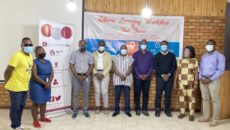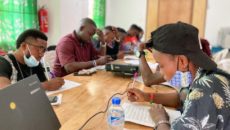The following piece was sponsored by Accountability Lab.
“We weren’t ensuring that the communities were a part of the planning of activities we implemented.”
This was a confession of one of the participating organizations sharing their stories on failures. Celebrating success is obvious. But what if we also celebrate stories of failures by recognizing that brand-new ways of thinking are often the result. Additionally, sharing these mistakes can ensure that other organizations avoid the same. The recent Fail Faire organized by Accountability Lab, with support from the West African Civil Society Institute, provided such a platform by bringing together more than 30 civil society organizations from across the region. As part of the process, 12 CSOs working in accountability, open governance, natural resource advocacy, gender advocacy, the rule of law, and inclusion submitted their failure stories. Out of these, 5 were selected by a panel of judges. These included Equip Liberia, Leemah Inc., Community Healthcare Initiative, Shalom Liberia, and Women Solidarity Incorporated. Their stories demonstrate how learnings from failures can be integrated to inform and improve future work.
Ensuring community ownership – frustrated with the lack of a long-term solution to provide sanitary pads for girls during their periods, Naomi Solanke, founder of the Community Healthcare Initiative, reflected on what was not working and realized her team was designing solutions without consulting and taking into account the needs of the community. After multiple failures, CHI learned the lesson around the importance of community ownership. They tried a new approach in two locations – Kakata and Caldwell – and scaled it up to other counties by training local women and girls to produce sanitary pads through existing local cooperatives. This led to dramatic changes as they began to see more savings through savings clubs and reinvestment that produced more sanitary pads. This ensured sustainability, as there was no longer a need for donors to pay for the product. According to Solanke: “The girls can now allot a certain percentage of profit made into their small savings and at the same time always have funds to purchase materials and tools and even maintenance of the tools to keep the initiative sustainable.”
Planning towards sustainability – Like most CSOs, one of the major and constant challenges facing Leemah Inc. was fundraising. The organization was completely dependent on external funding for its work on addressing sexual and gender-based violence among young women and girls. For more than four years, Leemah hoped to obtain grants from big international donors to sustain its work. In the absence of a proper fundraising strategy, funding was inconsistent. Miatta Tarpeh, the founder, wanted to diversify her approach. Learning from her failures and what has worked for others, she decided to shift the focus from advocacy to incorporating entrepreneurship activities to generate income. The organization now trains women to develop different skills. This ensures economic empowerment for women in the community as well as sustainability for the organization. To further diversify funding streams, the organization is also looking at local sources of funding by reaching out to businesses, local CSOs, state agencies, and individuals. Tarpeh reflects: “The lesson learned from our failure of lack of strategy to raise funds was to use the skills we had within the organization to engage with entrepreneurship as a means of fundraising, instead of waiting on donor funding every time for the organization to survive.”
Engage stakeholders in innovative ways – For Equip Liberia, challenges began when they noticed a reluctance by stakeholders to participate in meetings designed to bring together community and faith leaders to talk about sexual and gender-based violence. Without financial compensation, the team at Equip Liberia realized there was no incentive for stakeholders to join these meetings. To encourage participation, they began livelihoods development training sessions. The stakeholders responded very positively to the initiative, and attendance increased as all participants started joining the meetings. Roland T. Suomie, executive director of Equip Liberia, pointed out: “The livelihood skills training also serves as part of the sustainability mechanism for communities. Communities are now saving money from their productions through a cash box system, and some communities have started responding to SGBV cases on their own.” Suomie also emphasized the importance of engaging continuously with the community to collect feedback and improve the project approach and outcomes.
Adhering to legal requirements – Kunue Benjamin Massally, who heads Shalom, recalls how the lack of proper documentation cost the organization a five-year project that had been pre-approved for funding. Having survived through the Ebola epidemic and the systemic failure of the Liberian state, the team had confidence they were prepared to handle any shock. However, when donors asked for documentation as part of a due diligence process, the team failed to submit tax clearance documents before the deadline. As organizations grow and seek funding from large donors, they are scrutinized to a significant degree. Lack of compliance with legal requirements is a risk not worth taking. With this lesson in mind, Shalom now maintains up-to-date records of all documents and does not wait for the proposal submission period to comply with local laws around taxes or human resources. The organization also asks for sectoral clearances at least three months in advance to avoid any last-minute delays and sees it as “a minimum standard that is required of us to maintain our credibility.”
Communicating challenges with donors – Women Solidarity Incorporated realized they had not included some important activities in their project budget only after they began training traditional leaders in business development. Most of the women in the group were unable to read and write, which meant the team had to invest extra time to bring them up to speed in understanding how to maintain records and documentation of transactions. They decided to include adult literacy training and also make sure a staff member remained in the field for longer than anticipated to provide the right kinds of support that the women might need. Caroline Armah, the executive officer, shared how the team prioritized outcomes over activities. They could have ticked off the activities after the training was completed, but they knew this was insufficient. The team decided to collect feedback from the women interested in receiving their support through focused groups discussions and one-on-one interviews. They documented these and sent them to the donor to make them aware of the needs on the ground. In their communication to the donor, they also recommended including an outcome rather than an output-based monitoring and evaluation plan, which has led to constructive conversations about more flexible funding.
Authored by Nyema Richards, Director-Program and Learning, Accountability Lab Liberia, and Parnneh Mallobe, Communications Lead, Accountability Lab Liberia.
Featured photo by Bernard Goldbach



